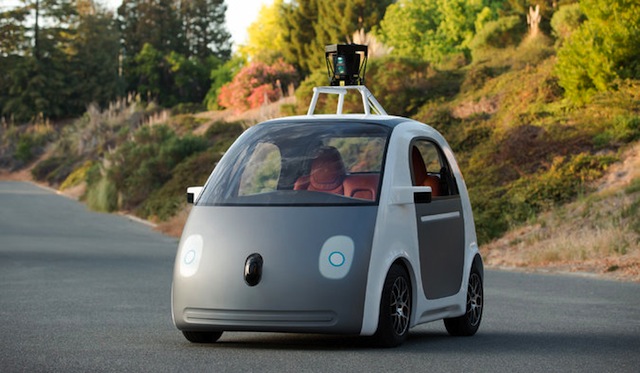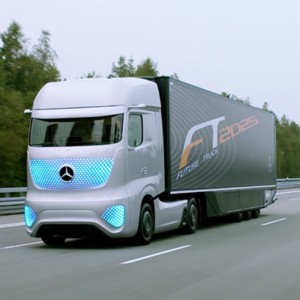We are developing the social individualist meta-context for the future. From the very serious to the extremely frivolous... lets see what is on the mind of the Samizdata people.
Samizdata, derived from Samizdat /n. - a system of clandestine publication of banned literature in the USSR [Russ.,= self-publishing house]
|
There was a news article a week or two back saying that driverless cars currently under test in California had been involved in four collisions. This sounded bad until you dug into the details and it turned out that in each and every case it was a human driver at fault. As Nassim Taleb points out there is no such thing as confirmatory evidence, but this in no way falsifies my theory that driverless cars are already safer than their human-directed equivalent.
This makes me think that the driverless car revolution is on the way and is going to take place far sooner than most of us think. Yes, there are legal issues to be resolved. Yes, government will drag its feet. Yes, there will be horrible accidents of the sort only computers can cause. Yes, there will be a transitional period of mixed human and computer driving. But it will happen and it will – over all – be better. But given it is going to happen I wonder what it will be like? For instance:
- Will cars continue to be user-owned? Will we even have “our” exclusive cars or instead use cars in the same way we use taxis today?
- Could this make micro-cars more attractive?
- Will styling continue to be so important?
- Is there anything to prevent a speed-limit of 120mph, or higher, on motorways? If so, what future inter-city trains?
- Will this advantage electric cars?
- If buses can self-drive is there any future for commuter trains?
- If cars can drive themselves to and from our doorsteps will we still need driveways?
- Is this good or bad news for Uber?
- What will cabins be like without the need for a driver and a steering wheel?
- Will there be implications for the layout of vehicles?
- How soon will it become illegal to drive a car on the public highway?
It’s going to be fascinating to watch.  Hopefully they’ll look better than this.
“I guess it’s going to come down to what consumers want to do,” said Lt. Chris Cummings, the Police Department’s liaison to the Taxi Commission.
– Report here. Thank you Instapundit.
Lt. Cummings didn’t say if he approved, because the Police Department’s job is to enforce ordinances, not make them. Maybe he was speaking through gritted teeth. But the Portsmouth Taxi Commission is unanimously for it. Good for them. The more Uber and its rivals are allowed in this or that place, somewhere, and the more we get to hear about it, the more chance that they will be allowed almost everywhere.
To people saying “pulling The Interview means the terrorists won”: we’ve been taking our shoes off at airports for no reason for 14 years…
– @ozchrisrock (Not the real Mr Rock, but as quotable.)
It was slightly quicker to go from London to New York 55 years ago on a de Havilland Comet, including the refuelling stop in the middle, than to go direct on a modern airliner and take in the two security theatre performances at either end.
Great confidence is being expressed about how robot cars are about to change the world. Robot cars, says a typical headline that Google (one of the prime movers in this new technology) has just today alerted me to, may be coming sooner than you think. But doubts are also being expressed:
A good technology demonstration so wows you with what the product can do that you might forget to ask about what it can’t.
Case in point: Google’s self-driving car. There is a surprisingly long list of the things the car can’t do, like avoid potholes or operate in heavy rain or snow.
Yet a consensus has emerged among many technologists, policymakers, and journalists that Google has essentially solved – or is on the verge of solving – all of the major issues involved with robotic driving.
“Essentially”. That’s a word that often means “not”. And “on the verge of” often signals a problem that turns out to be hideously intractable, as year after year passes with nobody any nearer to a definitive answer. I seem to recall an entire British high speed train project being abandoned because they just could not make the tilting of the carriages work perfectly. It worked okay, but okay wasn’t good enough. It had to be perfect, and perfection proved elusive. Here is what wikipedia says about that, for whatever wikipedia may be worth when reporting a story that remains controversial.
Even that constantly repeated refrain about how robot cars are coming “sooner than you think” is, if you think some more, an acknowledgement from robot car boosters that there are actually widespread doubts out there in the regular, non-techy world about how well these devices really will work, and how completely, above all how quickly, all the problems that they will face have really been and will really be solved. Yes, the techies will eventually get their robot cars working, probably. But for a few more years yet, there will surely be a nasty little clutch both of known unknowns and of unknown unknowns to deal with, all of which will have to be thoroughly dealt with. Crucially, such problems will all have to be solved. If robot cars get the go-ahead and work flawlessly for two months, followed by a lurid catastrophe like something out of a disaster movie, when a bunch of robot cars all follow each other into a swamp or over a cliff, or just run amuck and kill dozens or even hundreds in one catastrophe like in a plane crash, then their introduction will be judged a failure rather than given nine out of ten for technical accomplishment and an A plus for effort.
This strikes me as a lot more immediately promising:

→ Continue reading: Robot lorries now seem to me more immediately promising than robot cars
Earlier this week I got back from a week in Brittany. During the first few days of my stay, I and the friends I was staying with visited the island of Belle Ile. Their daughter is my god-daughter, and she was singing (very well) in a classical singing festival that happens in Belle Ile every year.
While in Belle Ile we also enjoyed other sorts of music making. In particular, at midday, in the fish market of Belle Ile’s biggest town, La Palais, we listened to a small beat combo called, as I later learned from the small print in some of my photographs, Les Gadgos. Les Gadgos are a bunch of blokes, but they have engaged a lead singer for their latest clutch of songs and their latest CD, a blond chanteuse named Mélody Linhart, who looked weirdly matter-of-fact in her days clothes. But she sang very well, in English. She did various venerable American standards, like St James Infirmary, and slightly more recent American movie tunes, including I Want To Be Like You. She made the latter piece of froth sound almost as profound and existential as St James Infirmary.
But take a look at this other Les Gadjos person, who I now know to be called Clément Lenoble:

A classic French type, I think you will agree. But that cigarette was actually quite a surprise, because Clément Lenoble was one of the very few people whom I observed during my week in France who was smoking. There were a few. He wasn’t the only one. But the basic news is, those Frenchies are no longer fumer-ing. Not the sort who live in or summer in Brittany, anyway.
Instead, this business is on the up and up:

That was just a clutch of e-cigarettes in the window of a shop that also sold other stuff. But later, I came across an entire shop devoted to this one product:

French smokers are a dying breed. No doubt, anti-smoking fanatics would reply that they’re a dying breed because smoking is killing them all off, and I do agree that this change of habit is probably a good thing. But even so, I miss guys like this, singing their gravel-voiced chansons in bars, with their whiskey glasses on the piano and their gauloises hanging down from their creased and lived-in faces. Or maybe I just miss the idea of such people, being around, in France.
Smoking is now illegal in most public places in France. I just wish les pouvoirs-that-be had been content to let the habit die away of its own accord. But that is not how such people think.
I also photoed many other more fun things.
→ Continue reading: Some Brittany holiday snaps
Talk about a fine bit of opportunistic business! Well done!
Even if checking every passenger exhaustively was the right way to thwart terror, why would any serious government issue a press release about it, informing the terrorists that you were on their case and keeping them up to speed on the things you’re looking for? They didn’t do that with Bletchley Park and the Enigma codes. Leaving aside the possibility that our leaders are just plain dim, we must assume their statements are a clever decoy. In that case, everything that we must endure at Stansted and Heathrow is pure ‘security theatre’. This would not be unusual. Much of what passes for ‘security’ and its kissing cousin ‘safety’ is little more than an elaborate show.
– Michael Hanlon. He has a book out with a co-author about safety issues, which looks interesting.
We’re in a political campaign, and the candidate is Uber and the opponent is an asshole named Taxi.
– Uber CEO Travis Kalanick
Gratitude to City A.M.’s Lynsey Barber for spotting this quote and supplying the link to it.
It’s one thing to read a Guardian piece complaining about Uber. That certainly makes Uber seem like a fine thing, but you can’t trust everything you read, can you? Maybe Uber is not actually as great as the Guardian is making it appear. Last Friday evening, a week ago, by a lucky chance, I went one better. I had an actual trip in an Uber-taxi. It was a good experience.
Rooted as I am in the twentieth century, I was not the one who set this journey in motion. The man who did was my twenty first century friend Rob, who is as computer-savvy as I am computer challenged. I and Rob were guests at a dinner party, and I heard that he and another guest had some kind of lift home fixed, going back towards central London, and I asked if I could join in. Yes, fine. I then rather delayed things by taking what turned out to be rather too long to do my thankyous and farewells, because, basically, I am not used to taxis being this fast in answering the call. But, eventually I was aboard, and off we went.
It was only when I was in it that I learned that this was one of these new-fangled Uber taxis, this being why it had arrived so quickly to pick us up and why I should have been quicker off the mark when leaving the party.
What Rob had done, as soon as he and the other guest decided they needed to be off home, was crank up the Uber app on his smartphone and summon – and here’s the point of this system – the nearest Uber taxi, by looking for blobs on his smartphone Uber-map.
On our journey, we and the driver chatted about how the new system worked. New technology often has this effect, I find. It gets people talking. It reminded me a bit of the early days of blogging, which got all sorts of people in touch with each other who would never normally have been communicating.
Our driver preferred his new Uber-life partly because he now gets no grief from a demanding taxi-cab office with its rigid time and place demands and general stress and hassle. He now eludes that middle man and, via his new and improved middle man (Uber), instead relates directly to his passengers. There is an elaborate regime to register both complaints from drivers about passengers, and from passengers about drivers, but for a driver who wants to do an honest job, that’s all good, just as it is for passengers who are willing and indeed eager to behave themselves.
We passengers also like the service that the driver and his comrades provide, because it is cheaper than old-school taxis, and quicker, and easier to track. But given that Uber is so cheap for us passengers, and given that the driver pays twenty percent of the reduced fare that we pay him to Uber, how come the driver is nevertheless such a contented guy?
A big plus for the driver is that he now works exactly when he likes, that being what a lot of the grief between him and his former taxi office had been about. He can start and stop when he pleases, with no warning concerning either, provided only that he finishes all paid-for journeys he embarks on.
But just as impressive as the increased flexibility the driver enjoys is that the flip side of us having hailed the nearest Uber taxi to us when we wanted to start our journey is that our driver is immediately available to start his next useful journey just as soon as he has completed his previous one. Our driver had been taking someone to that particular part of suburban London, and within moments there we were, wanting him to take us back to the middle of London from that same out-of-the-way spot. He doesn’t have to drive back, empty, to some damn taxicab office. He resumes work at once. This is why Uber-taxis are cheaper. This is not done by lowering the standard of living of the drivers or the quality of the product. It is done by seriously improving the efficiency of the drivers and their vehicles.
You can tell that Uber is a massive efficiency gain by the fact that the regular black cab drivers are in a state of fury about it, and have been threatening to screw up London’s traffic, with some kind of demo/disruption or suchlike. Their excuse is that there is apparently some law or other which, in the opinion of the cabbies and their lawyers, these new Uber-taxis are breaking, concerning computer tracking or something. But such complaining seems likely only to publicise that if the law is getting in the way of Uber, then it should stop.
If you want some more jeering at those angry black cabbies, see what City A.M.’s Guy Bentley has to say about them.
That the black cabbies are demonstrating against Uber in particular, rather than against “Kabbee, Hailo, Addison Lee, GetTaxi, Uber and Green Tomato” merely serves to establish Uber in the public mind as the market leader. I daresay there are also “network” reasons why one big brand leader is advantageous to most customers. So, big win for Uber, I’d say.
I am sure that there are many, many tweaks to Uber that I am not even remotely aware of, the kind where not only do I not know the answer but where I had never even thought of the question. But presumably Uber-savvy commenters can fill in many more details.
In particular: what could go wrong? Our driver didn’t seem to have any worries. But, was he perhaps being a tad optimistic? Will his income maybe decline if lots more want in on the driving side of things? What about if robot cars join in, and snatch away his job? Great for us passengers, because if it’s not it won’t catch on. But not so great for our driver.
Once you start talking about systems like Uber and robot cars in the same sentences, is the longer term implication of things like Uber going to be: fewer privately owned cars? Will Uber 3.0 be the first robot car killer app?
But oh yes, back in the here and now, one further detail I do now remember the driver talking about. If you are an Uber customer based in Los Angeles (as a recent passenger of his was), you can use the exact same account to whistle up our London driver as you have already been using in LA. The exact same account. Think about that. In any Uber-enabled city, and there are now a lot of such cities around the world, you can use taxis with the kind of confidence you already have about Uber-taxis in your own back yard.
My guess would be that a characteristic Uber first time user is someone who is about to venture to a foreign city where Uber is in action, and he signs up for Uber beforehand, so that he knows his taxis in the strange foreign landed will then be sorted at non-punitive expense and without grievous risk. Where he lives, he has a car and trusts the local taxis. But in foreigner-land, Uber taxis will be a massive plus. Then, once he has sampled the service in a strange city, the obvious next thing will be to use it back home more regularly. If that’s all approximately right, you can see why the black cabbies are spitting blood.
But alas for the black cabbies, their complaints are only advertising Uber to a global audience of city-hopping tourists and businesspersons. London’s black cabs are famous the world over. So if they are now moaning about Uber, that’s a global story. With enemies like this, Uber hardly needs an advertising agency.
But that’s enough guessing from me about Uber. Over to our commenters and their amazing ability to share a collective conversation with us and with each other, thanks to the work of an earlier generation of computer-magicians.
One of my favourite, regular visit websites is Dezeen. At least half of the stuff there is of very little interest to me. But, I find myself wanting to look at about a quarter of it more carefully, and a single figure percentage of what it sticks up tends to interest me a lot. That’s a lot of interestingness, when you consider that Dezeen is, as of now, updated several times every day.
In particular, Dezeen often features an interesting new gizmo, news of which can be easily rehashed into one of those ain’t capitalism grand postings that we love to do here, as often as we are able to tear our eyes away from the ghastliness of politics.
So, for instance, today, Dezeen has a description of a supersonic airplane, the distinguishing feature of which is that instead of the airplane having lots of windows for its highly paid passengers to look out of, it instead has cameras recreating the visual effect of looking out, and much more continuously and impressively than is possible when you are relying on real windows. Like this:

Quite how exactly this arrangement fakes the real experience of looking out of a continuous window shaped like that, I do not know. Will 3D effects be involved? But considering that the faster an airplane goes (this one is intended to be very fast indeed) the more expensive it becomes to carve windows into it, and considering that the cost and bulk and weight and quality both of cameras and of screens are all variables that are moving in exactly the right directions, this struck me immediately as one of those “Why did I not think of this?” ideas. By that I do not mean that I could do the actual work of contriving such an airplane, merely that I ought to have realised far sooner than today that other much more engineering-savvy people than I would very soon be talking in public about such notions, and that they presumably have been doing this for quite some while, without me noticing it.
I would further assume that the structural benefits to having an airplane which does not have a lot of quite large holes scattered all along its fuselage must be considerable. Yes:
“It has long been known that the windows cause significant challenges in designing and constructing an aircraft fuselage. They require additional structural support, add to the parts count and add weight to the aircraft,” said the company.
On the other hand, if what is required inside the airplane is concentration on the job to be done when the airplane has landed, as might well be the case, then other imagery can go in the “window” instead. Or, presumably, no imagery at all.
Relying on cameras for a task like this means that if the worst happens and the cameras all go haywire, nobody dies. A few people merely have a somewhat less amusing trip than they might have been anticipating. Do the pilots have an actual window in front of them? That might be wise, but maybe not.
Whatever the details are, and indeed whether or not this particular airplane ever gets anywhere near taking to the air, I’m impressed. And talking of people who are much more engineering-savvy than I am, I wonder what our commentariat thinks about this notion.
On a Tuesday evening shortly before Christmas, I arrived at London Gatwick Airport on an Easyjet flight from Morocco. I wanted to travel to my home in Southwark as quickly as possible. The quickest and simplest way to do this is to catch a train from Gatwick Airport railway station in the terminal to East Croydon and then London Bridge, followed by another train to South Bermondsey, the nearest station to my home. A single ticket for this journey costs £14.60, a fare I find to be a bit steep. Knowing the fare system reasonably well, I instead purchased a ticket to East Croydon, the first station inside Greater London at which the train stopped. For this, I paid £4.50. I then used my Oyster Card – the contactless ticketing system that Londoners use for most of their public transport journeys within London – to get to South Bermondsey. This was charged using the zone based fare system that applies within London, and cost me £2.20. I was thus able to reduce the cost of the journey by more than 50%.
This is not fare evasion. What I did is perfectly legal, and I can’t be punished for doing it, but surely it is against the spirit of the fare laws. The powers that be have decided that the wealthy plutocrats who can afford to fly Easyjet can also afford to pay £14.60 for a train journey from central London to the airport. By taking advantage of the cheaper fares available for shorter journeys, I am demonstrating my contempt for the wise decisions of these people. Let us call it fare avoidance. As it happened, a ticket inspector stopped me part of the way through the journey, and berated me for my lack of public spiritedness and civic responsibility, and just generally told me off for failing to spend money that rightly belonged to the families of good, honest people such as ticket inspectors. How would such people be able to feed their families if everyone behaved like this?
Actually, no he didn’t. What he actually said was “Thank you sir. That’s great”. It’s also possible he wished me a merry Christmas.
In these enlightened days of state-controlled railways and fare control it is sometimes difficult to believe that there was a time when railways were monopolies red in tooth and claw and were more or less free to do what they wanted.
And here, from a hundred years ago, we have an egregious example of precisely the sort of monopoly abuse we have so often been warned of. It’s revision time for fares and you know what’s coming: they’re… er… reducing them:
 The Times 3 December 1913 p5 Well, that’s as may be but the only reason they’re doing that is because they’re making the service… er… better:
In anticipation of the opening of the first section of the electrified suburban lines during the coming year…
As it happens the lines to which they refer weren’t electrified until 1916 – not that that is particularly important.
So, what’s going on? Well, as Brian Micklethwait likes to point out everything competes with everything else. Railways may not compete much with other railways but they sure as hell compete with buses, trams, cars, moving nearer work and finding a job nearer where one lives.
Even so, railwaymen often refer to the “sparks effect”. This is the phenomenon whereby a newly electrified line will see a significant increase in passengers. With that in mind you would have thought they could increase their fares. I can only imagine fares are being reduced because they are able to run more services.
By the way, not strictly relevant but I loved this from column 1 on the same page:
Mr J. D. Gilbert asked the chairman of the Highways Committee whether in view of the by-laws allowing passengers to stand in the tramcars, the committee had considered the advisability of issuing notices, similar to those in use in Manchester, asking ladies to have all hatpins protected.
|
Who Are We? The Samizdata people are a bunch of sinister and heavily armed globalist illuminati who seek to infect the entire world with the values of personal liberty and several property. Amongst our many crimes is a sense of humour and the intermittent use of British spelling.
We are also a varied group made up of social individualists, classical liberals, whigs, libertarians, extropians, futurists, ‘Porcupines’, Karl Popper fetishists, recovering neo-conservatives, crazed Ayn Rand worshipers, over-caffeinated Virginia Postrel devotees, witty Frédéric Bastiat wannabes, cypherpunks, minarchists, kritarchists and wild-eyed anarcho-capitalists from Britain, North America, Australia and Europe.
|











